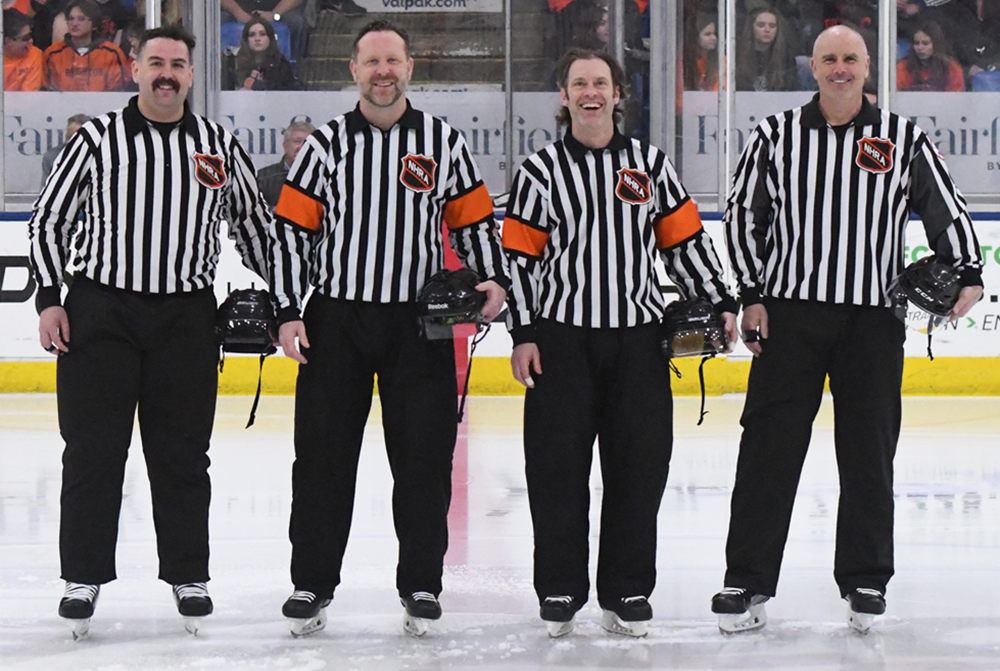
Be the Referee: Toughest Call
November 16, 2017
In this week's edition, assistant director Mark Uyl explains why pass interference is the toughest call for our football officials to make.
Be The Referee is a series of short messages designed to help educate people on the rules of different sports, to help them better understand the art of officiating, and to recruit officials.
Below is this week's segment – Toughest Call - Listen
At all levels of football, far and away the most difficult and controversial call to make is pass interference.
Pass interference can be challenging for officials because so much of it is based on judgment. Were the two players moving down the field making a legitimate play on the football; or did one of the two players initiate contact that created a disadvantaged situation for the opposing player?
Remember, when the ball is in the air, that both players – the offense and the defense – have an equal right to go for the football, making a legitimate play on it. But when that illegal contact occurs, that’s when the flag should come for pass interference.
Past editions
November 9: Hurdling - Listen
November 2: The Survey Says - Listen
October 26: Helmet Comes Off - Listen
October 19: Goal Line Rules - Listen
October 12: No 1st-Year Fee - Listen
October 5: Athletic Empty Nesters - Listen
September 28: Misunderstood Football Rules: Kicking - Listen
September 21: Preparation for Officials - Listen
September 14: Always Stay Registered - Listen
September 7: Other Football Rules Changes - Listen
August 31: Pop-Up Onside Kicks - Listen
August 24: Blindside Blocks - Listen

Be the Referee: Hockey Officials
By
Paige Winne
MHSAA Marketing & Social Media Coordinator
March 5, 2024
Be The Referee is a series of short messages designed to help educate people on the rules of different sports, to help them better understand the art of officiating, and to recruit officials.
Below is this week's segment – Hockey Officials - Listen
Throughout the high school hockey season, you are used to seeing three officials on the ice. But starting in the Quarterfinal round, four officials are used. The four-person system utilizes two referees and two linesmen. And that’s used for quarters, semis and the Finals.
This system allows for more coverage. The two referees can concentrate on penalties and other rules. The two linesmen's primary duties are offsides and icing.
The move to four officials allows for more consistent coverage of the fastest game in the MHSAA. And like we do in other sports, the best officials are chosen for the final rounds.
Previous Editions
Feb. 27: Less Than 5 - Listen
Feb. 20: Air Ball - Listen
Feb. 13: Hockey Penalties - Listen
Jan. 30: Wrestling Tiebreakers - Listen
Jan. 23: Wrestling Technology - Listen
Jan. 9: 3 Seconds - Listen
Dec. 19: Unsuspecting Hockey Hits - Listen
Dec. 12: No More One-And-Ones - Listen
Nov. 21: Football Finals Replay - Listen
Nov. 14: Volleyball Unplayable Areas - Listen
Nov. 7: Pass/Kick Off Crossbar - Listen
Oct. 31: Cross Country Interference - Listen
Oct. 24: Soccer Overtime - Listen
Oct. 17: Tennis Spin - Listen
Oct. 10: Blocked Kick - Listen
Oct. 3: Volleyball Double & Lift - Listen
Sept. 26: Registration Process - Listen
Sept. 20: Animal Interference - Listen
Sept. 13: Feet Rule on Soccer Throw-In - Listen
Sept. 6: Volleyball Jewelry - Listen
Aug. 30: Football Rules Similarities - Listen
Aug. 23: Football Rules Differences - Listen

